Raised on oil: Azerbaijan takes the driver's seat in global climate talks but will 'black gold' legacy threaten its green transition?
The country is gearing up to take the spotlight as the host of crucial climate talks. In the second of a series in the run-up to COP29, CNA digs into how this fits with its role in prolonging fossil fuel use and connections to the oil industry.
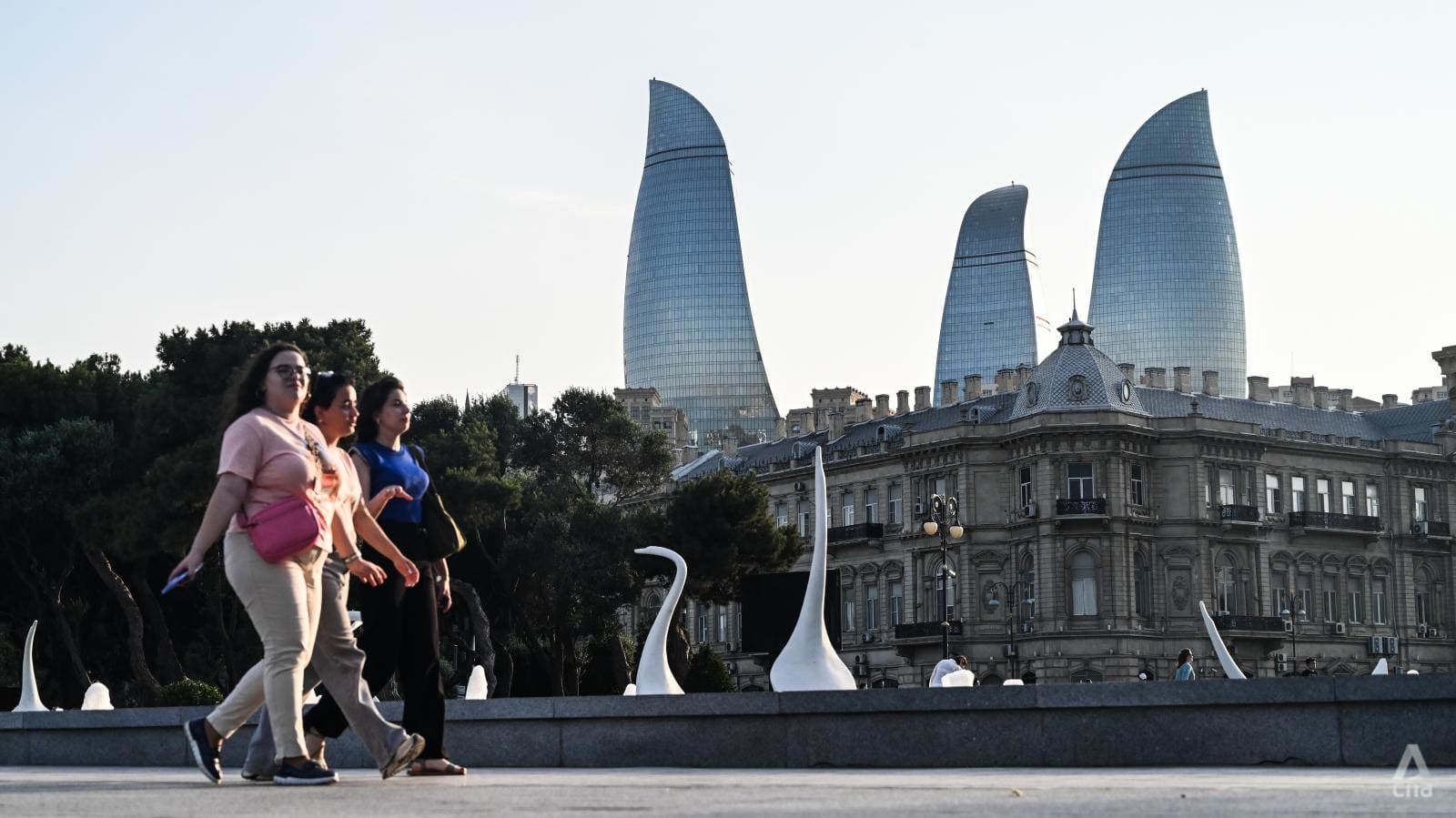
Azerbaijan has built an audacious skyline, on the back of proceeds from its oil and gas sectors. (Photo: CNA/Jack Board)
BAKU: The Azerbaijani capital is a burgeoning city with prospects directly borne from its immediate surroundings.
To Baku’s east lies the Caspian Sea, the world’s largest inland body of water and holder of rich and deep reserves of oil and gas, long exploited for energy and exports.
And surrounding the city’s expanse are the harsh, sprawling oil fields of the Absheron peninsula, veined with “black gold” and few signs of life but the derricks endlessly drilling below the surface.
Baku is a city built on the foundations - on the living legacy - of oil.
Extraction has been the main game for Azerbaijan, from its days as a Caucasian backwater in the mid 19th century, to becoming a crucial energy cog in the Soviet Union machine, to the years that have followed as an independent nation since 1991.
The oil and gas sector accounts for an estimated 90 per cent of its exports and half of total gross domestic product.
These days Azerbaijan increasingly draws comparisons with Dubai for its bold architecture and audaciously ambitious growing skylines and waterfronts.
Its grand boulevards play host to a Formula One grand prix every year and this month, the city extends its hosting duties to the world’s biggest and most important climate negotiations - the Conference of the Parties, the United Nations climate talks known as COP.
But central to its presidency of COP29 will be to lead the world’s shift away from a fossil-fuel powered future, away from the very resources that have driven Azerbaijan’s prosperity for generations.
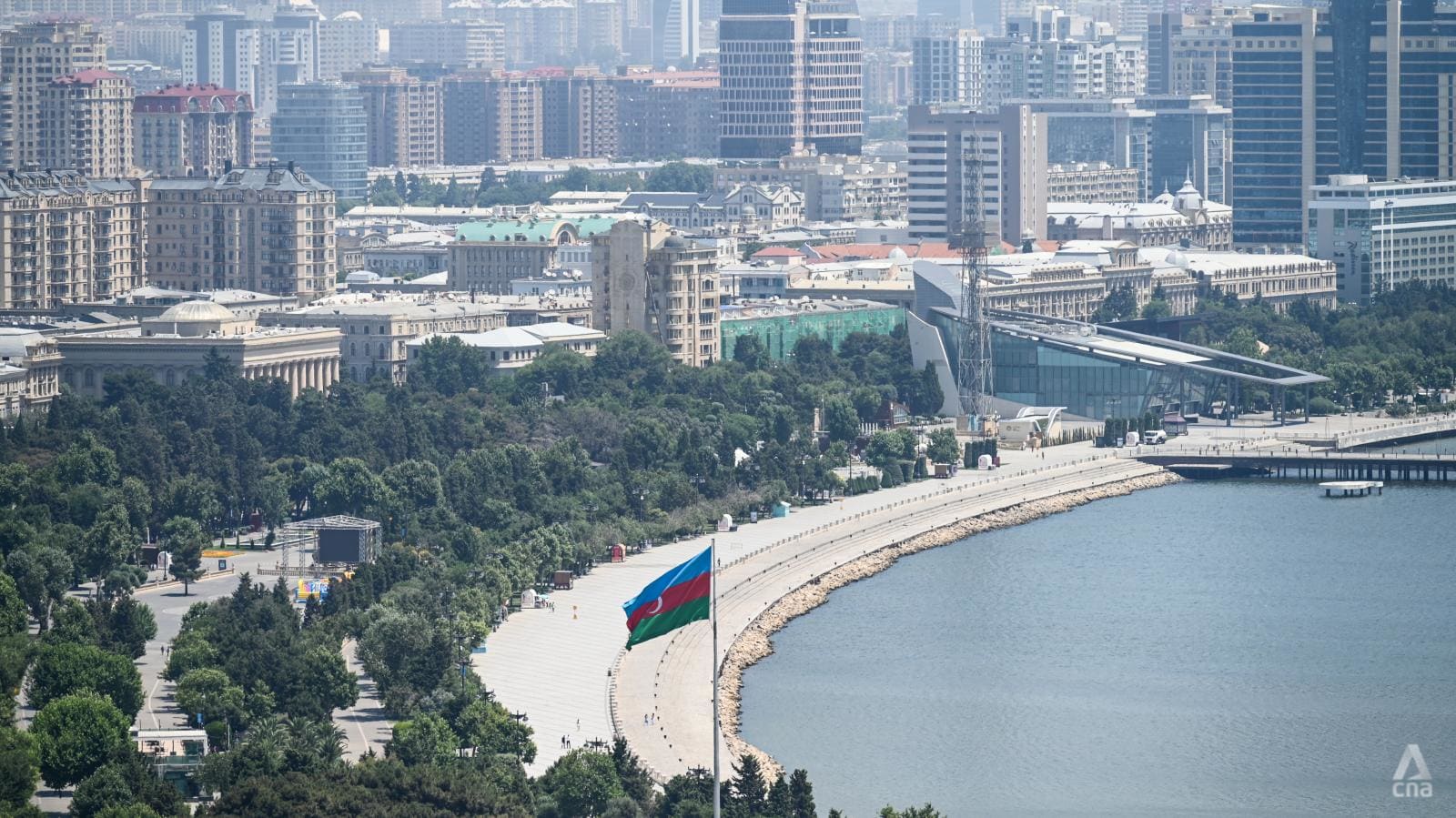
Taking the helm could signal a move towards a green revolution, say some experts. But others raise concerns over the country’s long-standing oil reliance and call for greater scrutiny of its energy network.
Azerbaijan’s hosting of COP29 will mean that for three consecutive years, an oil-producing nation has led the summit, following the United Arab Emirates last year and Egypt in 2022. And the words of Azerbaijan president Ilham Aliyev that oil was a “gift from God” still reverberate around climate negotiating circles.
“As the head of the country which is rich with fossil fuels, of course we will defend the right of these countries to continue investments and continue production, because the world needs it,” he said in a speech at the Petersberg Climate Dialogue in Berlin in April.
“Having oil and gas deposits is not our fault. It’s a gift from God,” he said.
But COP29 CEO and deputy energy minister Elnur Soltanov told CNA that deep connections with fossil fuels - and the intention to keep those industries operating - does not mean Azerbaijan is on a collision course with a broader green transition.
“From the start to the end, I think we have been at the forefront of all energy revolutions, and those revolutions were very significant in terms of creating the current civilisation,” he said.
“We see that that traditional way of development is now destroying the world. I think we are very ready to be at the forefront of this green energy revolution.”
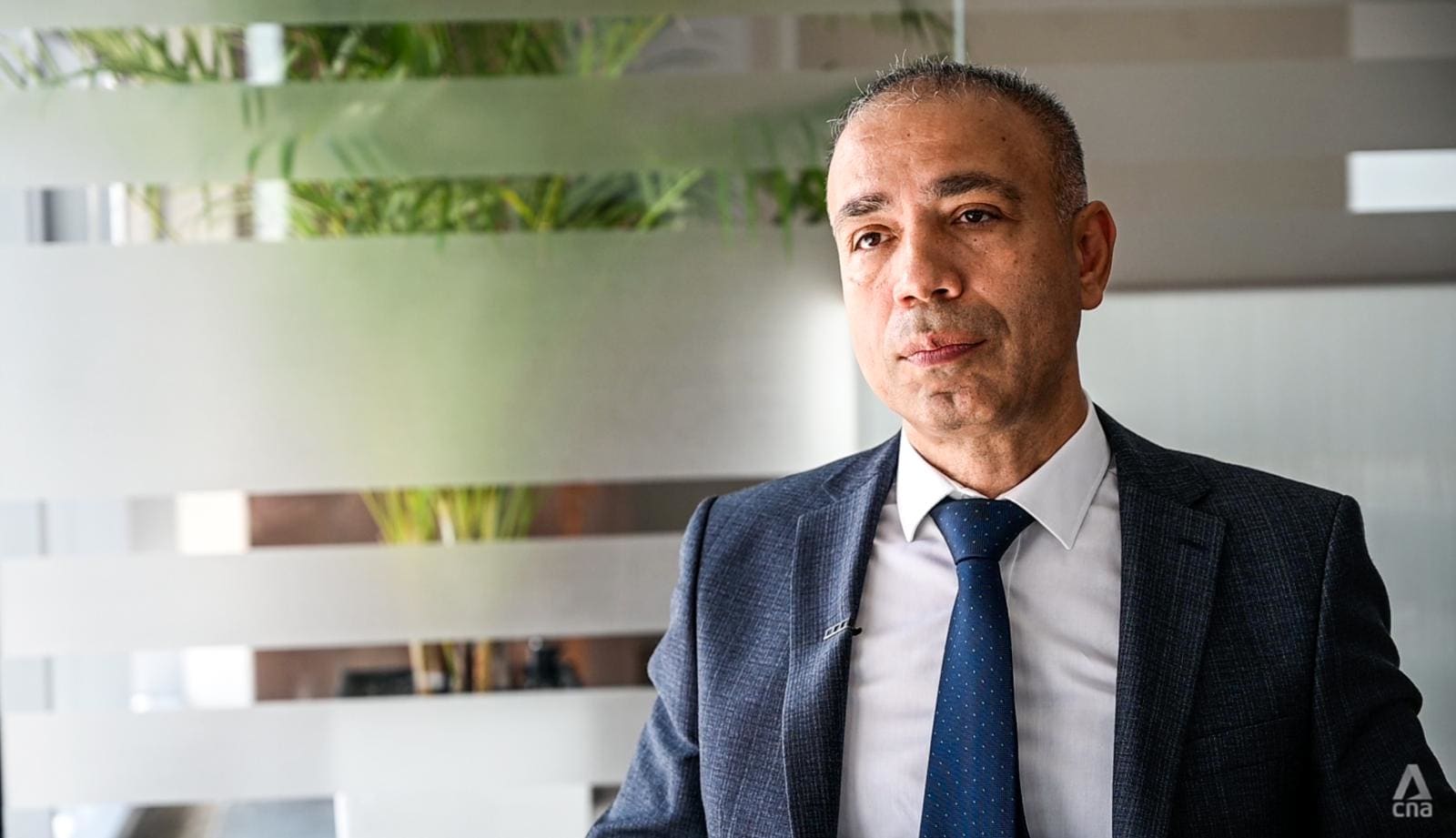
"BUSINESS AS USUAL"
The country’s state oil company SOCAR is a major player in an international consortium that manages and extracts Azerbaijan’s oil resources. International corporations including BP, Chevron, ExxonMobil and Equinor have also been investors in operations.
But the oil story is not what it once was in Azerbaijan. From its peak in 2009, daily crude oil production has halved to 479,000 barrels in June this year.
Reasons for the drop include declining resources in existing oil fields and the need to comply with international agreements - OPEC+ countries, a bloc to which Azerbaijan belongs, has production quotas to avoid market oversupply.
Still, major investments are still flowing into the sector. From earlier this year, BP is now operating a state-of-the-art offshore platform - the Azeri Central East platform - which cost US$6 billion and is capable of processing up to 100,000 barrels of oil per day.
But that is not enough to change what is on the horizon for big oil in Azerbaijan, according to Mr lham Shaban, the head of the Oil Research Center in Baku.
“The oil decline has been significant and will continue to decrease to the point where extracting oil will no longer be commercially viable,” he said.
“Whether this happens in 2040, 2045 or 2050 will depend on the price of oil and its associated costs at that time,” he said.
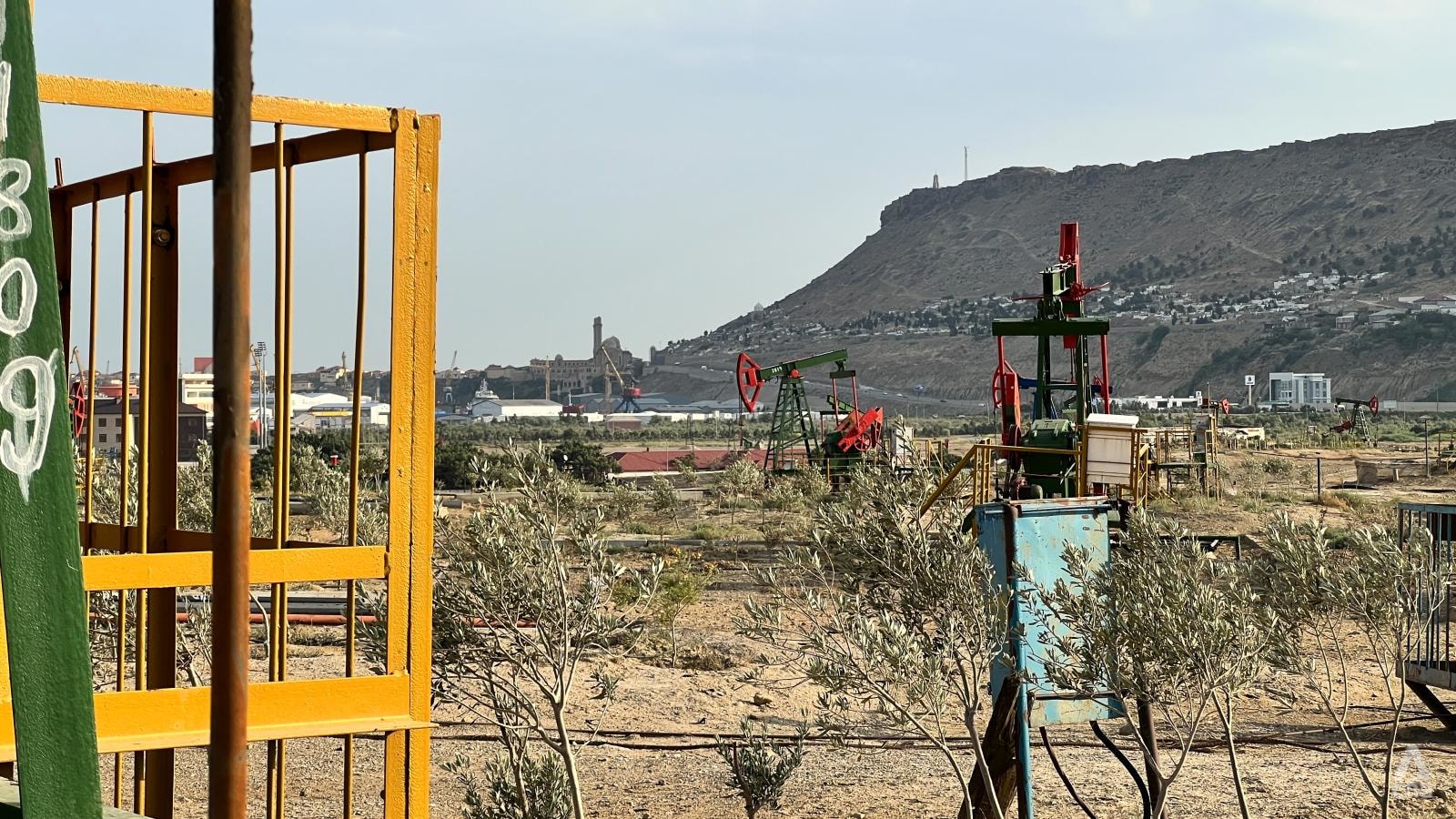
As oil production has slowed in recent years, natural gas has become an economic opportunity for the nation. Domestic production has soared over the past two decades - up nearly 500 per cent between 2000 and 2021.
In recent years, Azerbaijani gas has become a hot commodity. The Russian invasion of Ukraine resulted in Europe broadening its purchase markets for natural gas, due to disruptions in supply from Russia.
The EU was desperate for energy security and Azerbaijan proved a willing partner, explained Ms Kamala Mustafayeva, an independent oil and energy analyst based in Baku.
“Europe is the main destination for Azerbaijani gas. They simply need more gas from Azerbaijan. It doesn't matter about climate change or anything. You have to survive today, not tomorrow,” she said.
“Honestly, oil and gas production is business as usual.”
Azerbaijan has continued to develop the Shah Deniz Gas Field on the Caspian Sea, now one of the largest gas fields in the world.
Gas extraction is expected to continue “contributing significantly” to the economy in upcoming decades, according to the International Energy Agency.
At present, Azerbaijan is meeting around 5 per cent of Europe’s energy needs through the Southern Gas Corridor. It has pledged to double its exports to the continent by 2027.
“What does this mean? It demonstrates Azerbaijan's exceptional importance in the energy security of certain EU countries,” said Mr Shaban.
Despite these strategic moves within the fossil fuel sector, there are also opportunities for the country to expand its renewable energy infrastructure.
“Azerbaijan is looking even further ahead. What is the global trend? Green energy,” he said.
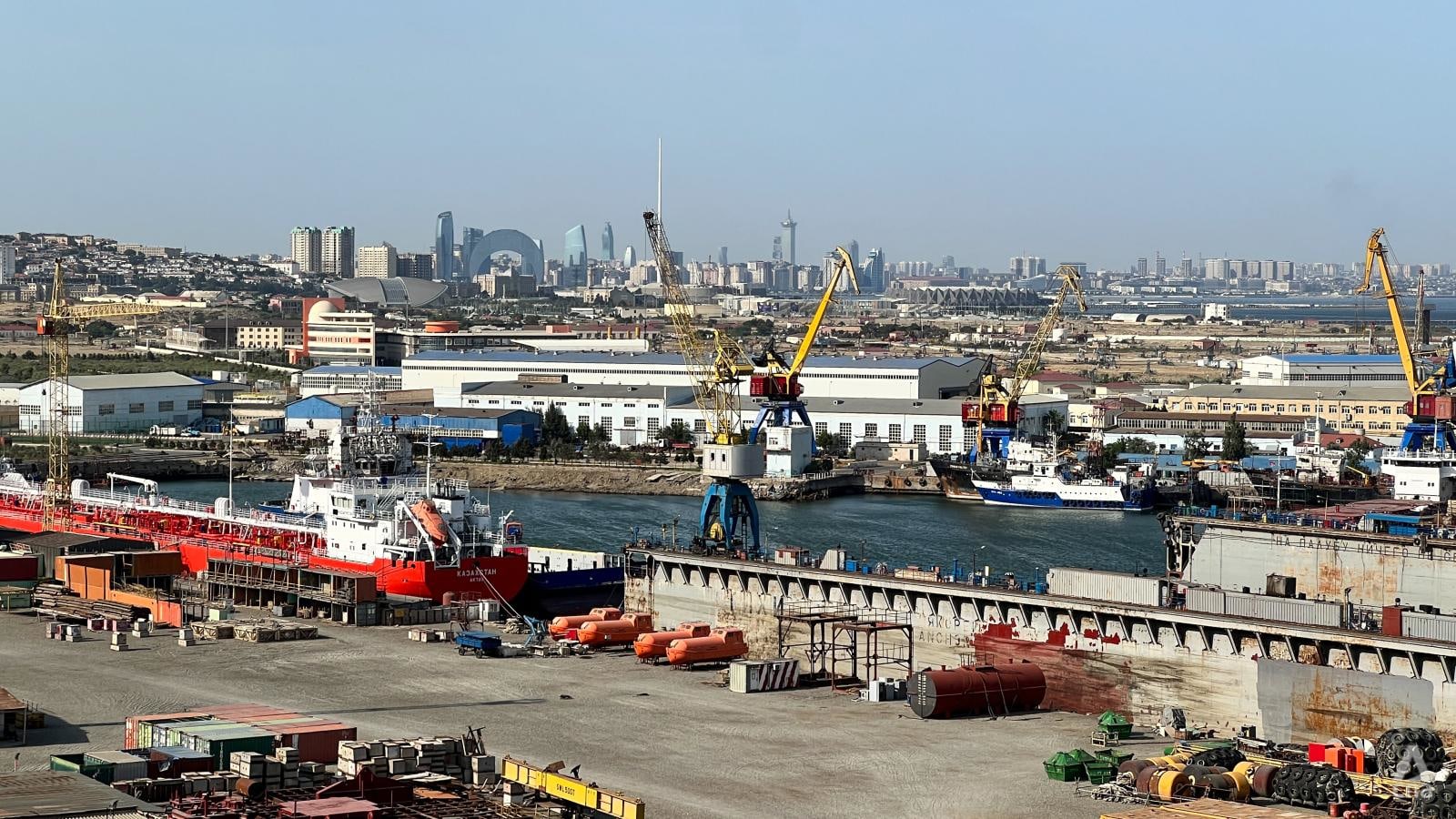
PAST, PRESENT AND FUTURE
South of Baku, urban sprawl quickly becomes a harsh dry steppe. Contained within this unforgiving landscape are monuments to the country’s past, present and future.
Some 40,000 years of rock carvings dating as far back as the Upper Paleolithic era are spread across the Gobustan Rock Art Cultural Landscape, a reflection of life for millenia in this part of the world.
Hundreds of mud volcanoes dot the area, in rare concentration. Their burbling craters and periodic eruptions are visible clues to the oil and gas riches below the surface.
Nearby, the Sangachal Terminal, one of the jewels in Azerbaijan’s energy taj, rises from the sands. It is a vast industrial complex of tanker berths, pipeline, storage tanks and turbines, servicing the oil and gas sector.
And about 80km south of the city is the latest installation - a vast solar plant that stretches across 550 hectares of gently contoured landscape, developed by Masdar Clean Energy from the United Arab Emirates.
The 230MW Garadagh Solar Power Plant consists of more than half a million individual panels absorbing the sun in a location that feels it intensely year-round.
It is one of the first of several similar solar and wind projects planned. Azerbaijan is making big green moves.
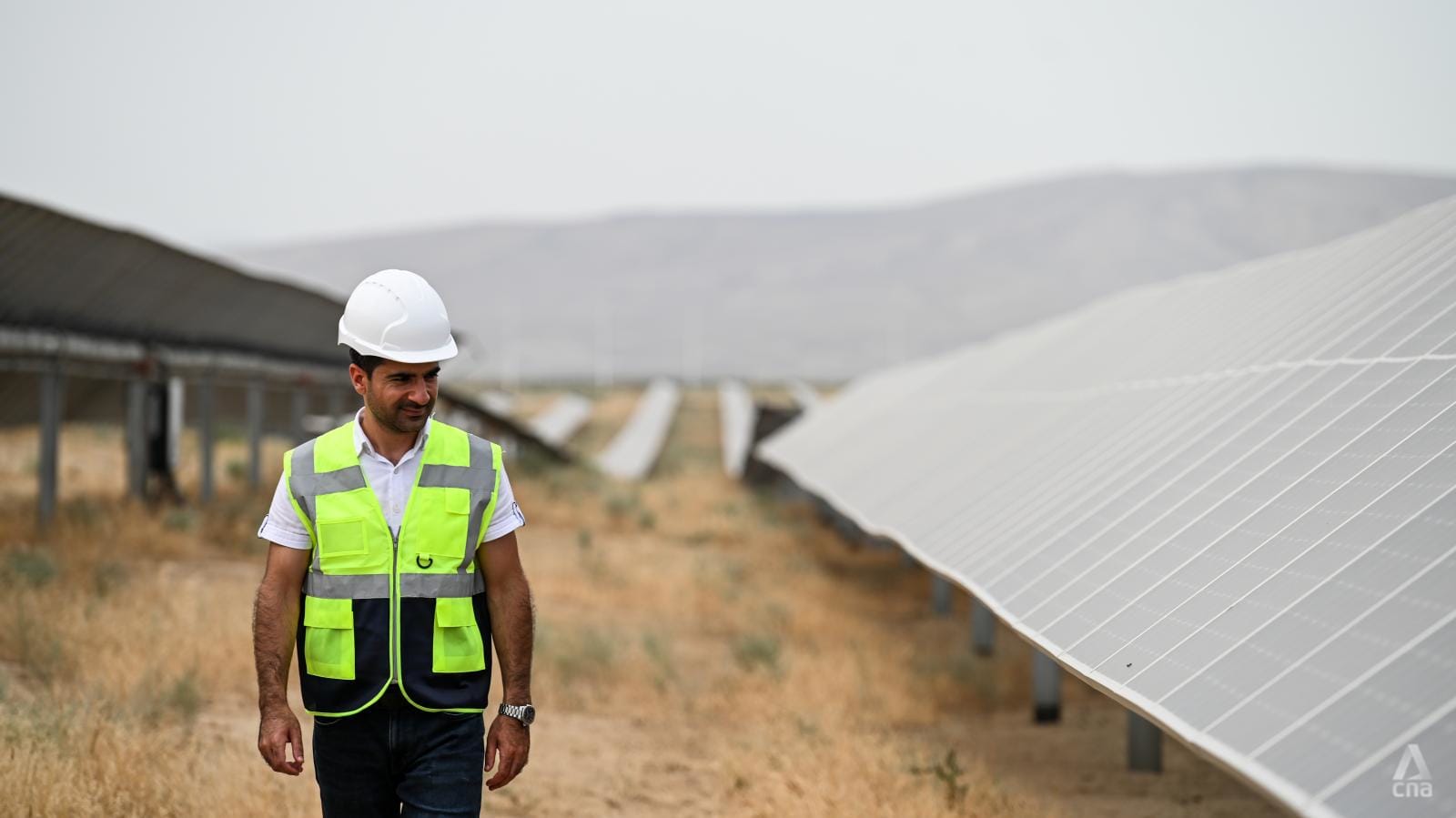
It aims to increase its renewable energy share to 30 per cent of total electricity production by 2030, lessening its carbon footprint to try and record a 40 per cent total emission reduction by 2050.
The reasoning for doing so is not just altruistic; there are economic incentives. Developing more clean energy for domestic use would allow the country to export more natural gas, which is currently servicing 90 per cent of the country’s electricity needs.
Following the Second Nagorno-Karabakh War in 2020, Azerbaijan regained control over several districts that were previously under the control of neighbouring Armenia. This land, largely emptied of people and razed by the conflict, has been earmarked for major green energy projects.
It has also signed key agreements such as the Black Sea Energy Project, which will transport green energy sourced from Azerbaijan through Georgia and under the sea to Romania and Bulgaria, as well with Uzbekistan and Kazakhstan for the transmission of green energy under the Caspian.
“There’s a realisation that Western countries will stop buying oil and gas. Maybe not tomorrow, maybe not the day after tomorrow, but probably in the predictable future. And it's understandable,” said Ms Mustafayeva.
“And at the same time, if you have renewable resources here, why not use them? Put them in the right place, and use them and maybe export more oil and gas.”
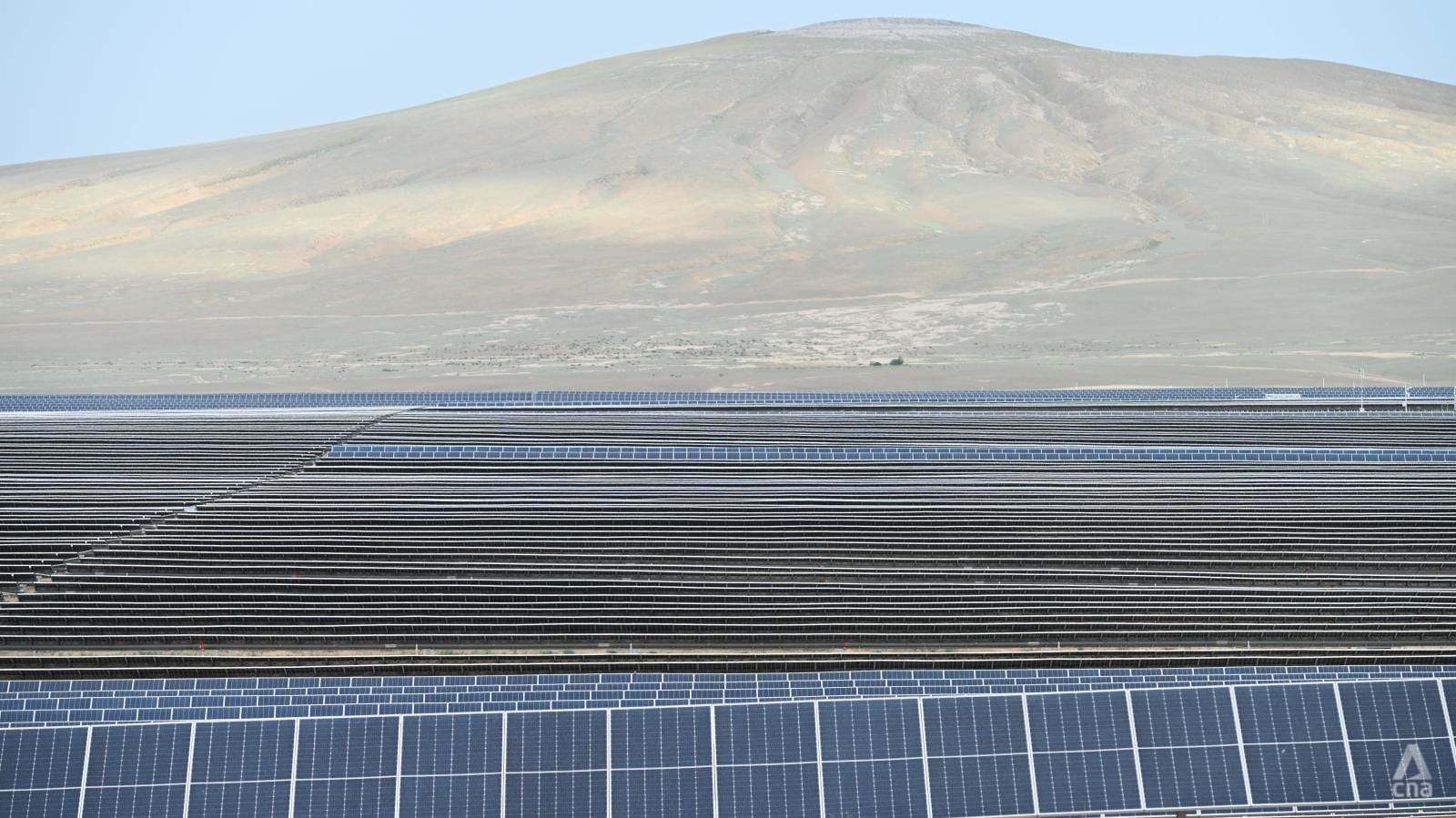
While that would also tidy up Azerbaijan’s own national greenhouse gases emissions count, it only moves a polluting problem to those buying its gas exports.
Climate accounting does not typically count exported emissions, meaning the pollution burden falls on countries that import and consume energy.
It is why there should be increased scrutiny on the entire energy network, from producer to seller to buyer, much of which has a strong Western footprint, said Ms Kate Watters, director of Crude Accountability, a human rights and environmental watchdog for the Caspian Basin.
She has deep concerns about the allegations of Azerbaijan’s poor human rights record, lack of transparency on key issues and entrenched levels of corruption, byproducts of a resource-heavy, largely state-controlled economy.
“I think one of the most important things to understand is our responsibility as Western consumers of fossil fuels in what's happening in Azerbaijan right now,” she said, mentioning the extensive investments from companies like BP, Total and ExxonMobil, Europe’s closer dependence on its energy exports and international green funding flowing to renewable power projects that are actually substituting in for national gas powering Azerbaijan’s oil sector.
“If we look at the supply chain from start to finish, are they just exporting their carbon emissions to Europe? Does that really answer the questions about how we get to a greener future, a future with fewer carbon emissions? No, it just pushes the pieces around,” she said.
According to the 2023 Corruption Perceptions Index, published by Transparency International, Azerbaijan ranks 154th out of 180 countries with a score of 23 out of 100, making it one of the most corrupt countries in the world.
In October, members of the European parliament strongly condemned the "Azerbaijan regime's longstanding domestic and extraterritorial repression of activists, journalists, opposition leaders, and others" and also labelled its "ongoing human rights abuses ... incompatible with its hosting of the climate conference".
They asked the European Commission to suspend the strategic energy partnership between the EU and Azerbaijan.
Azerbaijan's human rights record was also examined by the UN Human Rights Council's Universal Periodic Review Working Group for the fourth time in late 2023, with 319 recommendations made.
The government agreed to adopt 185 of those, including measures related to civil and political rights, anti-corruption and national human rights legislation.
President Ilham Aliyev has previously labelled claims of corruption by his family and government as "insinuations or half truths in order to discredit the image of Azerbaijan and undermine Azerbaijan’s position”.
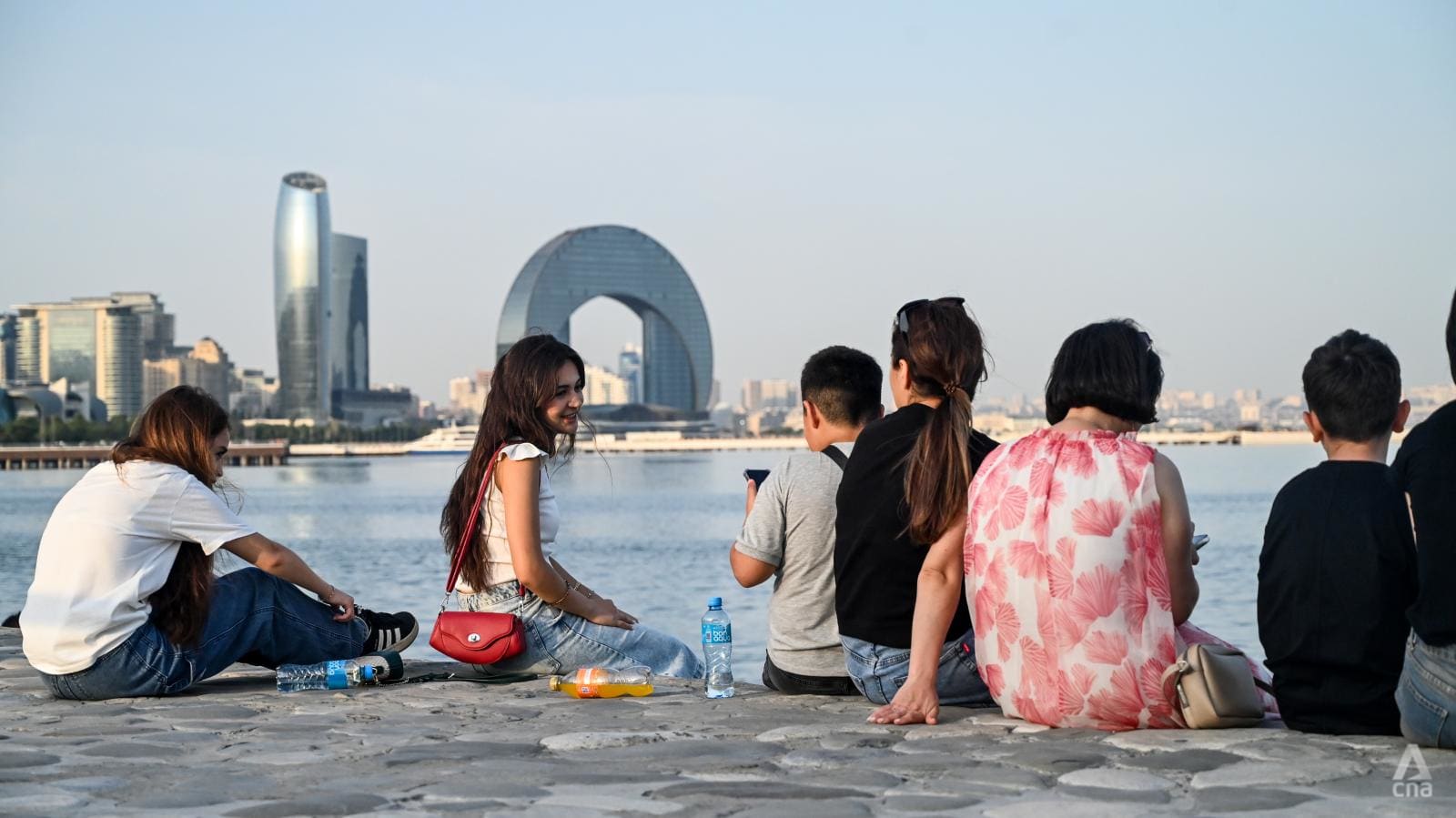
PUNCHING ABOVE ITS WEIGHT?
Taking up the COP presidency role has inevitably cast a light onto Azerbaijan’s climate record and its role in prolonging the use of fossil fuels.
And while Ms Watters - like other critics - expressed worries about global climate talks at COP29 being in the custody of another petrostate, for the summit’s leadership, it is a well-timed chance to be a change agent.
Mr Soltanov, the COP29 CEO, said that the government understood the global trends towards decarbonisation. While Azerbaijan is deliberately recalibrating its economy to move away from hydrocarbons, he explained, the world is still reliant on them.
“The entire world economy is based on hydrocarbons. Whether we like it or not, that's a matter of fact. And everybody, every country in the world, is an oil country, either a producer country or a consumer country, or both,” he said.
“We are planning to make sure that Caspian offshore resources, wind resources, are developed, will benefit Azerbaijan but will also spill over to the region and have global implications,” he added.
The headquarters for the COP presidency in Baku are located in an area of rejuvenation in the city. Close to the Caspian’s shore, new luxury apartments and business complexes with glistening glass stand in a place once condemned.
“The place we are today, we call it 'White City' because it was transformed. It used to be 'Black City' because of oil pollution,” Mr Soltanov said.
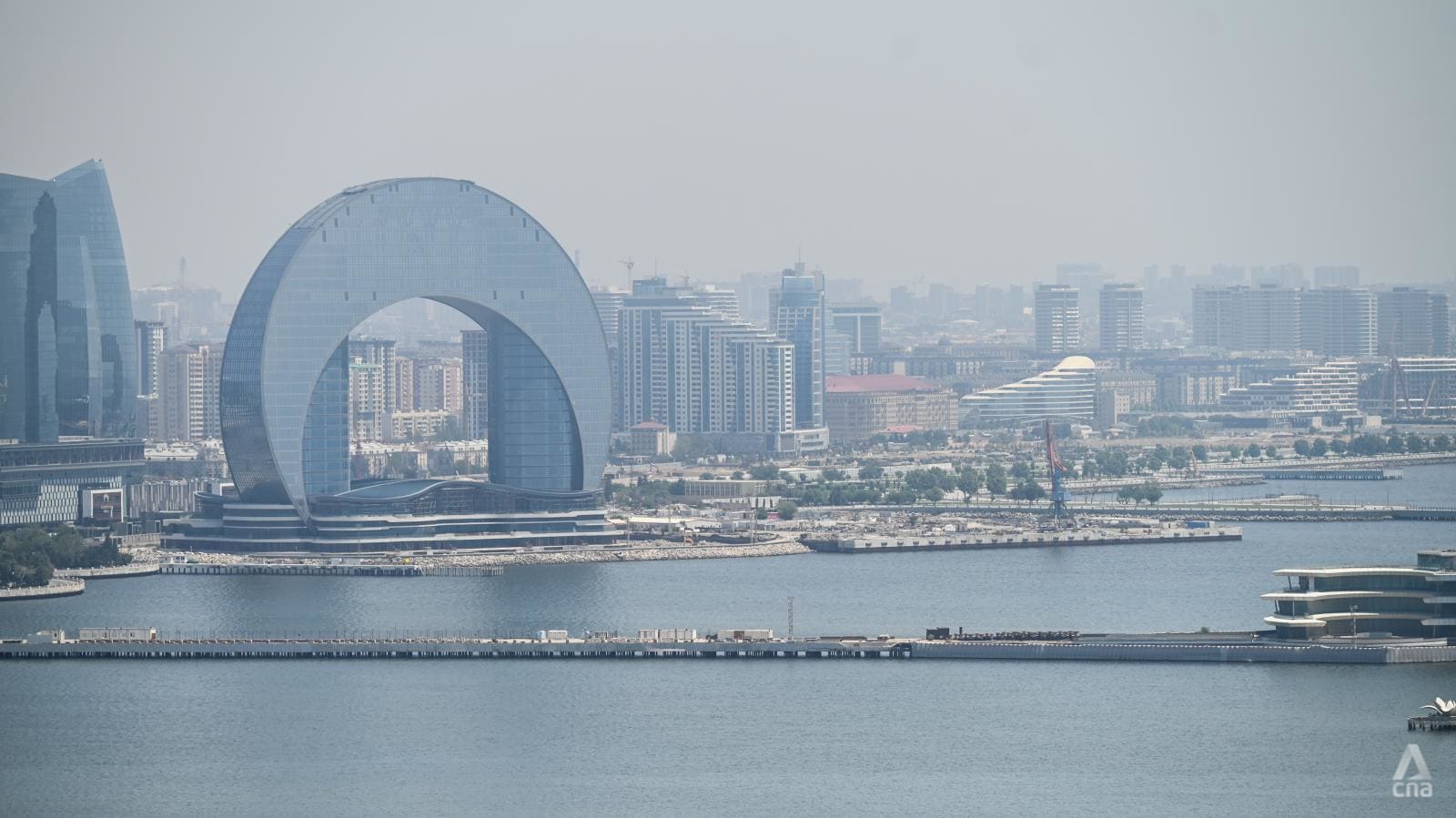
It is an apt metaphor, he said, for Azerbaijan’s story and the role it can play in transforming something harmful to the planet into something clean and useful.
“I think this is the area where Azerbaijan, as it has always shown, can punch above its weight and contribute now something that is valuable,” he said.
“We are ready. This is the trend. You cannot deviate from that.
“As long as you believe that the planet we have, we can lose, then anything you do in the direction of at least contributing to a solution to the climate crisis makes you feel good. At the end of the day, this is what matters.”
Fundamental questions remain about how Azerbaijan can wean itself off its natural resources. And economic diversification has proven a challenge for the government, said Mr Toghrul Valiyev, an independent economist based in Baku.
About half of the nation’s total budget revenue comes from oil and gas, but despite the vast natural resources riches under state control, the country has precious little stored sovereign wealth and relies on government spending to stimulate the economy.
When oil prices drop globally, it usually means rocky times for the people of Azerbaijan, Mr Valiyev explained.
“We haven’t created a real economy in our country. The oil price is an indicator of the health of our economy,” he said.
“Each time when we are facing an oil price drop, the government creates strategic programmes, some road maps for diversification.
“But in one or two years, the oil price starts to increase. And everyone forgets about it. And this is problematic for us because we don’t have any strategy for the future.”

The wealth created from oil has largely failed to flow through the broader economy, according to a report by Crude Accountability in 2020, which reported evidence that “revenues from the sale of Azerbaijani oil have not reduced the unemployment rate, have not alleviated poverty, and have not liberalised, diversified, or modernised the national economy”.
Azerbaijan still records deep levels of inequality. A 2021 report by the World Bank found the country has twice the levels of wealth inequality compared with any other in Europe and Central Asia.
“We see these fancy construction projects. We see snazzy buildings, new airports, roads that go nowhere, but when you go into villages or when you drive 15 to 20 minutes outside of Baku - never mind further out into the country - the signs of that wealth dry up pretty quickly,” Ms Watters said.
But Mr Shaban of the Oil Research Center countered that Azerbaijan had unalterably changed over the past few decades for the better, a direct outcome of exploiting its oil and gas resources.
He argued that the oil rush of the Soviet period had seen “cities created from nothing” and since independence, the republic has seen vast advancements.
“I often say Azerbaijan has gone through difficult times. People nowadays forget the bad days very quickly and think that everything should be perfect,” he said.
“Some people have the impression that all the money should be given to the people, or that we are far behind.”
Poverty has declined significantly in Azerbaijan, from 49 per cent in 2004 to 4.9 per cent in 2014, based on data from the International Fund for Agricultural Development. But these figures also show major disparities between Baku and rural areas.
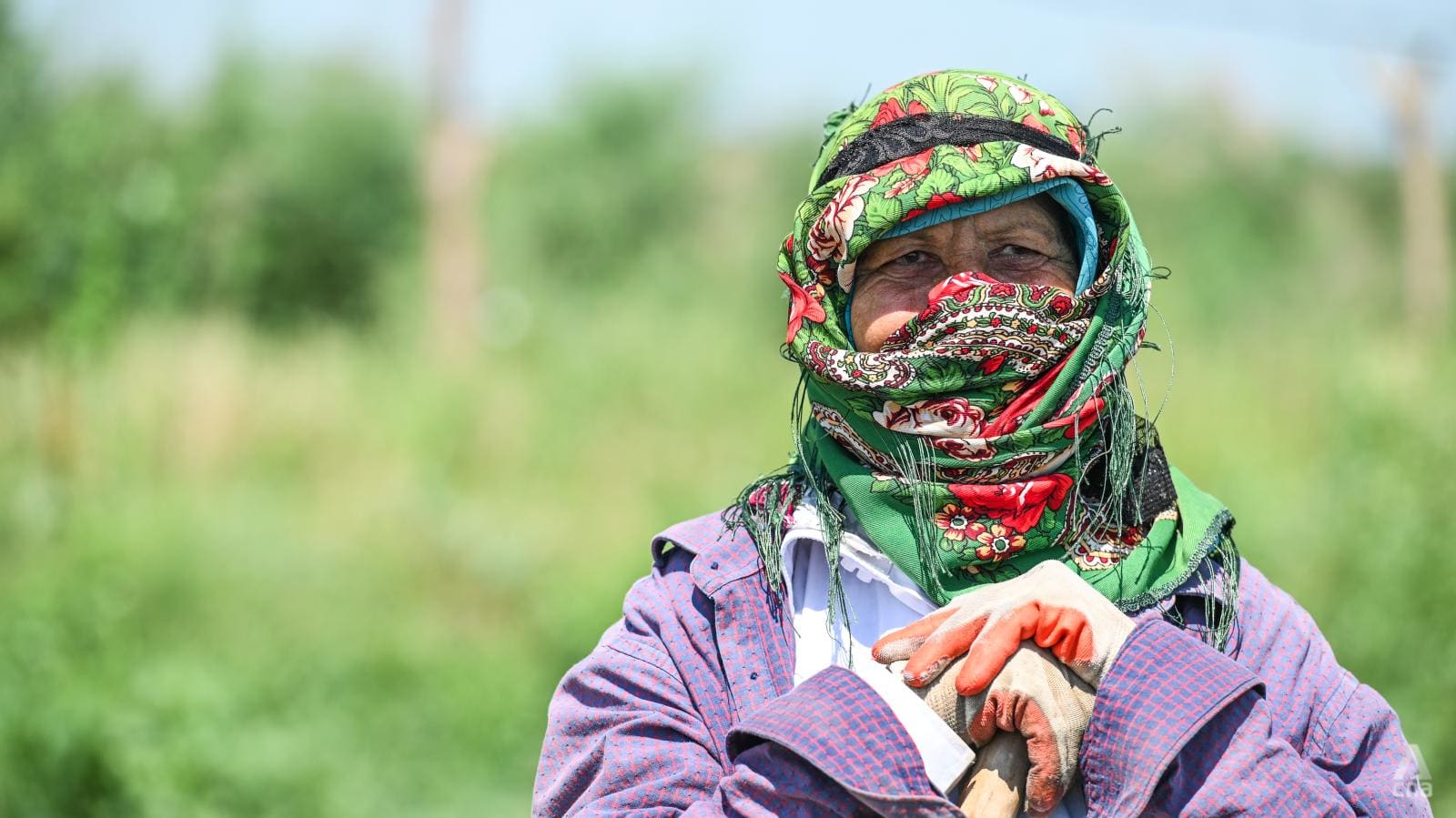
That is central to Azerbaijan’s climate story - and the greater global challenges of a “just transition”, where social impacts of shifting to a low carbon economy are front and centre.
For now, Crude Accountability has found that beyond not improving many people’s economic prospects in rural areas, fossil fuel infrastructure was causing “significant health impacts” in communities living in close proximity to it.
It has conducted extensive research on the environmental impacts of the oil industry within the country, an issue that is notoriously difficult to explore due to the opaque nature of operations and standards, said Ms Watters.
“It's really important again to remember that this isn't just data. These aren't just statistics. This is human life. These are generations of children who grow up in the shadow of toxic emissions,” she said
“We all need to take responsibility for our role in continuing this sort of fossil fuel economy that we all enjoy.”













